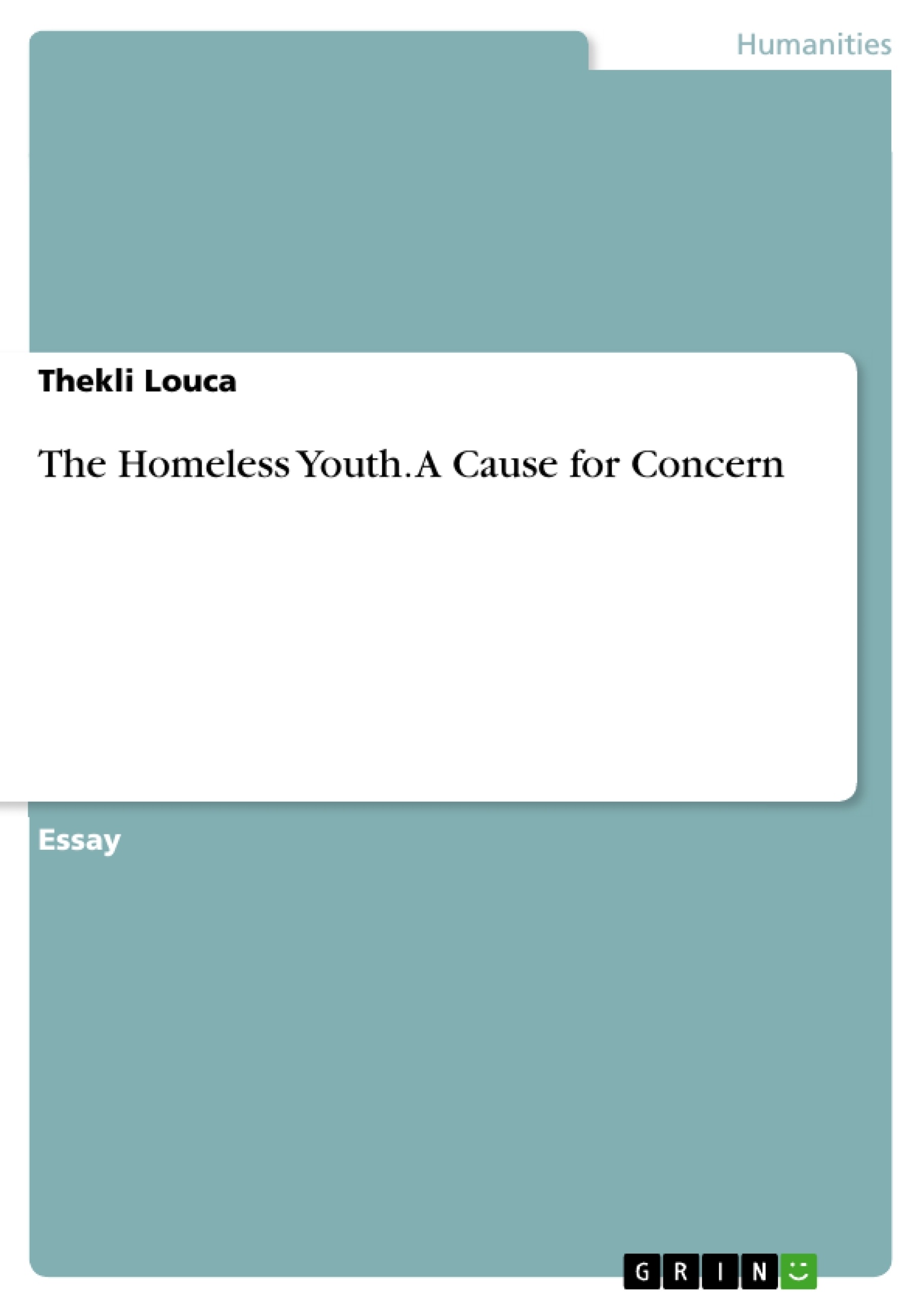The increasing numbers of the homeless population is currently one of the biggest issues in the UK. The homeless population is turning to local housing teams and homelessness charities for help. Many homeless people that approach housing agencies are under eighteen years old, and they are judged to be in priority need and the local housing departments are obliged to find them accommodation. Because the legal age that a young person is allowed to leave the parental home without the consent of the parent is sixteen, the numbers of homeless sixteen and seventeen years olds is rising. Statistics show that between seventy eight thousand and eighty thousand young people become homeless in the UK each year. However, the fact that the young homeless people are approaching local housing authorities for help and not their relatives has raised questions about their family background and the reasons for leaving the parental home.
Inhaltsverzeichnis (Table of Contents)
- THE HOMELESS YOUTH: A CAUSE FOR CONCERN
- The Increasing Numbers of Homeless Youth
- Family Background and Reasons for Leaving Home
- The Role of Parental Behaviour and Family Disruption
- The Age of Leaving Home in the UK and Other European Countries
- Abuse and Neglect as a Cause of Youth Homelessness
- The Care System and Youth Homelessness
- The Differences and Similarities of Homeless Youth with or Without Histories in the Care System
- The Connection Between Youth Homelessness and Chronic Homelessness
Zielsetzung und Themenschwerpunkte (Objectives and Key Themes)
This text explores the issue of youth homelessness in the UK, examining its causes, prevalence, and impact. It aims to raise awareness of the complex factors contributing to this problem and the challenges faced by young people who experience homelessness.
- The role of family dynamics and parental behavior in youth homelessness
- The impact of abuse and neglect on young people's lives and their likelihood of experiencing homelessness
- The unique challenges faced by care leavers and their vulnerability to homelessness
- The connection between youth homelessness and chronic homelessness in adulthood
- The need for effective interventions and support systems to address the problem of youth homelessness
Zusammenfassung der Kapitel (Chapter Summaries)
- The Increasing Numbers of Homeless Youth: This section introduces the problem of youth homelessness in the UK, highlighting the rising numbers of young people seeking help from housing agencies.
- Family Background and Reasons for Leaving Home: This section examines the reasons why young people leave their parental homes, focusing on factors like violence, neglect, abuse, and relationship breakdown.
- The Role of Parental Behaviour and Family Disruption: This section delves deeper into the role of parental behavior, particularly in disrupted families, and how conflict and abuse contribute to young people leaving home.
- The Age of Leaving Home in the UK and Other European Countries: This section compares the average age of leaving home in the UK with other European countries, highlighting potential cultural differences and the implications for youth homelessness.
- Abuse and Neglect as a Cause of Youth Homelessness: This section explores the link between child abuse and neglect and youth homelessness, discussing the long-term consequences of such experiences.
- The Care System and Youth Homelessness: This section examines the specific challenges faced by care leavers, including their high vulnerability to homelessness after leaving the care system.
- The Differences and Similarities of Homeless Youth with or Without Histories in the Care System: This section discusses research exploring the potential differences and similarities between homeless youth with and without care system histories, focusing on their experiences of abuse and neglect.
- The Connection Between Youth Homelessness and Chronic Homelessness: This section investigates the potential link between youth homelessness and chronic homelessness in adulthood, highlighting the need for further research and understanding of this complex issue.
Schlüsselwörter (Keywords)
Youth homelessness, family dynamics, parental behavior, abuse, neglect, care leavers, chronic homelessness, mental health, support systems, interventions, UK, Europe.
Frequently Asked Questions
How many young people become homeless in the UK each year?
Statistics show that between 78,000 and 80,000 young people experience homelessness in the UK annually.
What are the main reasons for youth homelessness?
Key factors include family disruption, parental violence, neglect, abuse, and the breakdown of relationships at home.
At what age can a young person legally leave home in the UK?
In the UK, a young person can leave home without parental consent at the age of sixteen.
Why are care leavers particularly vulnerable to homelessness?
Young people leaving the care system often lack a stable support network and face significant challenges in transitioning to independent living, making them highly susceptible to homelessness.
Is there a link between youth homelessness and chronic homelessness in adulthood?
Yes, the text investigates the connection, suggesting that early experiences of homelessness can lead to long-term housing instability and chronic issues later in life.
How does parental behavior contribute to the issue?
Conflict, abuse, and neglect within the family are primary drivers that force young people to seek help from local housing authorities rather than their relatives.
- Arbeit zitieren
- Thekli Louca (Autor:in), 2016, The Homeless Youth. A Cause for Concern, München, GRIN Verlag, https://www.grin.com/document/354363



